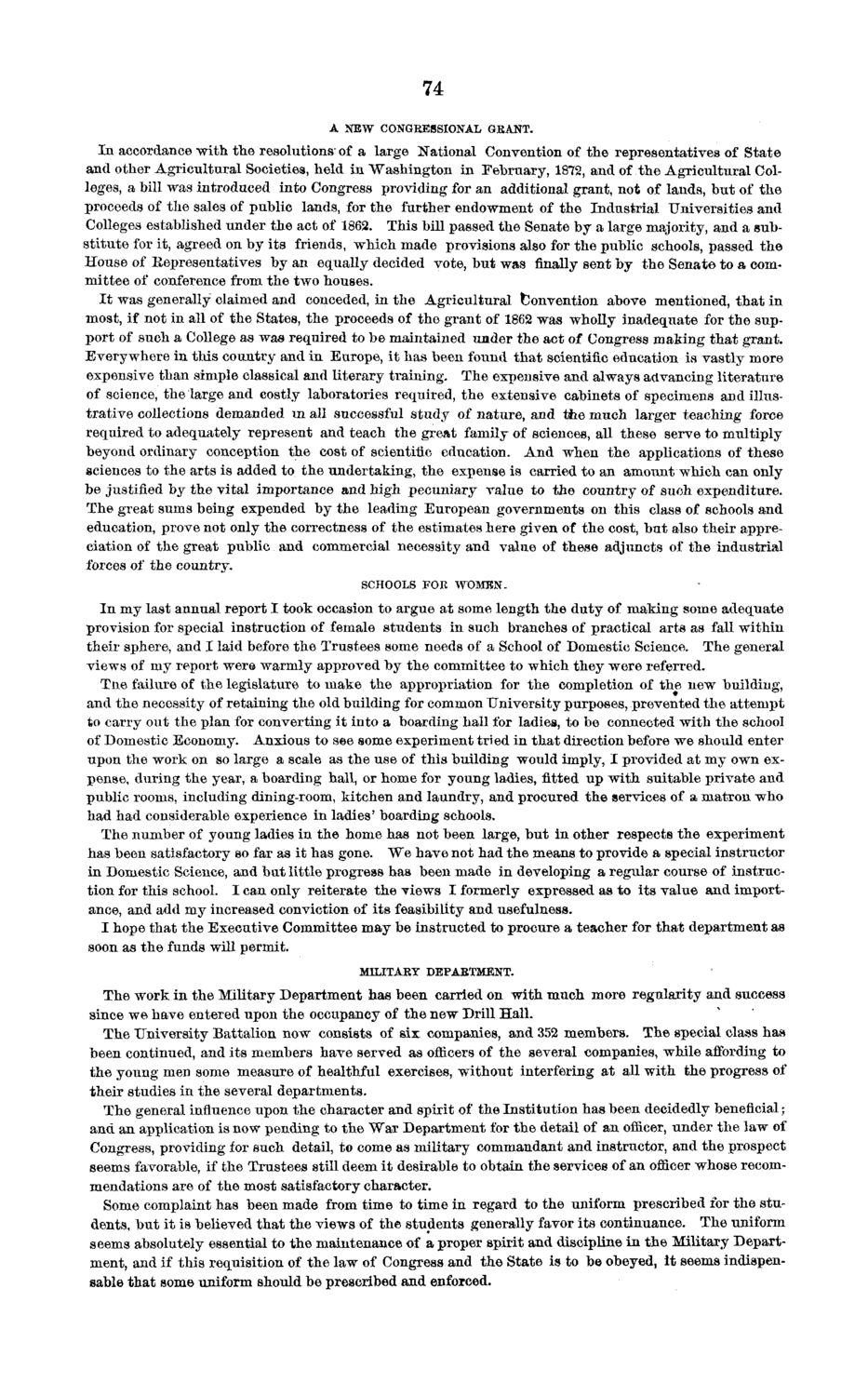| |
| |
Caption: Board of Trustees Minutes - 1873
This is a reduced-resolution page image for fast online browsing.

EXTRACTED TEXT FROM PAGE:
74 A NEW CONGRESSIONAL GRANT. In accordance with the resolutions' of a large National Convention of the representatives of State and other Agricultural Societies, held in "Washington in February, 1872, and of the Agricultural Colleges, a bill was introduced into Congress providing for an additional grant, not of lands, but of the proceeds of the sales of public lands, for the further endowment of the Industrial Universities and Colleges established under the act of 1862. This bill passed the Senate by a large majority, and a substitute for it, agreed on by its friends, which made provisions also for the public schools, passed the House of Representatives by an equally decided vote, but was finally sent by the Senate to a committee of conference from the two houses. I t was generally claimed and conceded, in the Agricultural Convention above mentioned, that in most, if not in all of the States, the proceeds of the grant of 1862 was wholly inadequate for the support of such a College as was required to be maintained under the act of Congress making that grant. Everywhere in this country and in Europe, it has been found that scientific education is vastly more expensive than simple classical and literary training. The expensive and always advancing literature of science, the large and costly laboratories required, the extensive cabinets of specimens and illustrative collections demanded m all successful study of nature, and the much larger teaching force required to adequately represent and teach the great family of sciences, all these serve to multiply beyond ordinary conception the cost of scientific education. And when the applications of these sciences to the arts is added to the undertaking, the expense is carried to an amount which can only be justified by the vital importance and high pecuniary value to the country of such expenditure. The great sums being expended by the leading European governments on this class of schools and education, prove not only the correctness of the estimates here given of the cost, but also their appreciation of the great public and commercial necessity and value of these adjuncts of the industrial forces of the country. SCHOOLS FOR WOMEN. In my last annual report I took occasion to argue at some length the duty of making some adequate provision for special instruction of female students in such branches of practical arts as fall within their sphere, and I laid before the Trustees some needs of a School of Domestic Science. The general views of my report were warmly approved by the committee to which they were referred. Tne failure of the legislature to make the appropriation for the completion of the new building, and the necessity of retaining the old building for common University purposes, prevented the attempt to carry out the plan for converting it into a boarding hall for ladies, to be connected with the school of Domestic Economy. Anxious to see some experiment tried in that direction before we should enter upon the work on so large a scale as the use of this building would imply, I provided at my own expense, during the year, a boarding hall, or home for young ladies, fitted up with suitable private and public rooms, including dining-room, kitchen and laundry, and procured the services of a matron who had had considerable experience in ladies' boarding schools. The number of young ladies in the home has not been large, but in other respects the experiment has been satisfactory so far as it has gone. We have not had the means to provide a special instructor in Domestic Science, and but little progress has been made in developing a regular course of instruction for this school. I can only reiterate the views I formerly expressed as to its value and importance, and add my increased conviction of its feasibility and usefulness. I hope that the Executive Committee may be instructed to procure a teacher for that department as soon as the funds will permit. MILITARY DEPARTMENT. The work in the Military Department has been carried on with much more regularity and success since we have entered upon the occupancy of the new Drill Hall. The University Battalion now consists of six companies, and 352 members. The special class has been continued, and its members have served as officers of the several companies, while affording to the young men some measure of healthful exercises, without interfering at all with the progress of their studies in the several departments. The general influence upon the character and spirit of the Institution has been decidedly beneficial; and an application is now pending to the War Department for the detail of an officer, under the law of Congress, providing for such detail, to come as military commandant and instructor, and the prospect seems favorable, if the Trustees still deem it desirable to obtain the services of an officer whose recommendations are of the most satisfactory character. Some complaint has been made from time to time in regard to the uniform prescribed for the students, but it is believed that the views of the students generally favor its continuance. The uniform seems absolutely essential to the maintenance of a proper spirit and discipline in the Military Department, and if this requisition of the law of Congress and the State is to be obeyed, i t seems indispensable that some uniform should be prescribed and enforced.
| |